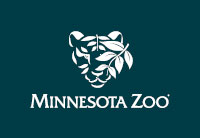African penguins live in the cold ocean off coasts of South Africa, Namibia, and Mozambique. They move to the beach mostly to mate, nest, raise young, and molt. Like many other penguin species, African penguins are endangered in the wild and are on the International Union of Conservation of Nature’s Red List of Threatened Species. In the last 50 years, the population of African penguins has dropped 80 percent mostly due to oil spills, historical hunting and destruction of their habitat. Right now, the greatest source of their troubles comes from a catastrophic drop in the number of sardines (a main part of their diet) as a result of overfishing and a changing ocean climate. Currently, the Minnesota Zoo is home to African penguins with our 3M Penguins of the African Coast exhibit, where guests can come face to face with these amazing animals and learn all about them from animal care experts.
live in the cold ocean off coasts of South Africa, Namibia, and Mozambique. They move to the beach mostly to mate, nest, raise young, and molt. Like many other penguin species, African penguins are endangered in the wild and are on the International Union of Conservation of Nature’s Red List of Threatened Species. In the last 50 years, the population of African penguins has dropped 80 percent mostly due to oil spills, historical hunting and destruction of their habitat. Right now, the greatest source of their troubles comes from a catastrophic drop in the number of sardines (a main part of their diet) as a result of overfishing and a changing ocean climate. Currently, the Minnesota Zoo is home to African penguins with our 3M Penguins of the African Coast exhibit, where guests can come face to face with these amazing animals and learn all about them from animal care experts.
Efforts to help African penguin conservation are monitoring population trends, hand-rearing, and releasing abandoned penguin chicks, along with setting up artificial nests and proclaiming marine reserves that prohibit fishing. You can help African penguin conservation by visiting the Minnesota Zoo or any other AZA accredited zoo and/or aquarium. Together, these facilities are helping to educate visitors about the endangered African penguins and other important species, and making them aware of what they can do to help.
Three simple things you can do to reduce your carbon footprint and help African penguins are the 3 Rs: reduce, reuse and recycle. For example, ride your bike or carpool whenever possible, turn off lights when you leave a room, use a programmable thermostat, switch to fluorescent lightbulbs, and find out what you can recycle in your area. As overfishing is becoming a danger to both fish populationsand their predators, knowing where your seafood comes from is also extremely important. Learn more about how you can become Fish Smart on our website.
“We feel that connecting with wildlife on a personal level will motivate people to take an active role in wildlife conservation,” said Dr. Tara Harris, the Minnesota Zoo’s Director of Conservation. To learn more about the Minnesota Zoo’s conservation efforts and how you can help, visit our Conservation webpage!





Get Social